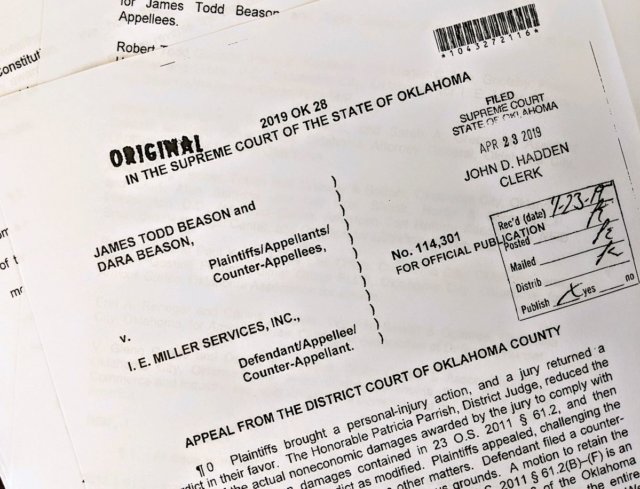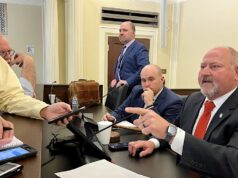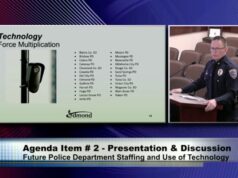

In a 5-3 opinion that has far-reaching implications for personal injury litigants, the Oklahoma Supreme Court ruled today that a $350,000 cap on the recovery of non-economic damages — commonly referred to as damages for pain and suffering — is unconstitutional. The lawsuit cap was enacted by the Legislature in a 2009 tort reform omnibus bill and was amended in 2011.
Tuesday, the Court held the statute was an impermissible “special law” because it targeted for different treatment only those who survive and bring civil lawsuits to recover for bodily injury. The statute did not impose the cap on wrongful death lawsuits brought on behalf of the estates of persons killed in accidents.
“The failing of the statute is that it purports to limit recovery for pain and suffering in cases where the plaintiff survives the injury-causing event, while persons who die from the injury-causing event face no such limitation,” Justice John Reif stated in the majority opinion.
The Oklahoma Supreme Court has spent nearly four years considering the appeal, which stems from a 2012 oilfield accident in which a crane toppled and injured Todd Beason, resulting in amputation of his arm. A 2015 trial in Oklahoma County District Court found the crane operator negligent and ended in a $14 million jury verdict, but $5 million of that amount was determined to be non-economic damages and subject to the $350,000 limit. A $1 million award to his spouse was also reduced by the statute.
The opinion, in Beason v. I.E. Miller Services, Inc., is considered among legal circles as a landmark decision that strikes a blow to tort reform efforts that significantly impacted jury verdicts and settlements in personal injury litigation. Business groups and tort reform advocates filed amicus curiae briefs in defense of the law.
The majority opinion said the tort reform cap violated Article 5, Section 46 of the Oklahoma Constitution that prohibits a special law targeting for different treatment less than an entire class of similarly situated persons.
“If a decedent can recover without limitation for pain and suffering during the time between the harm-causing event and his or her death, no good reason exists to treat a person who survives the harm-causing event differently with respect to recovery for the very same treatment,” wrote Reif, who is slated to retire from the court next week. Justices Richard Darby, Tom Colbert and Noma Gurich (in part) concurred.
The court previously ruled in 2013 that the omnibus tort reform bill violated the single-subject requirement for legislation, and lawmakers returned in a fall 2013 special session to pass the tort reform components separately.
Temporary justices involved
Special justices appointed temporarily to the Supreme Court to fill vacancies, Judge Jerry Goodman and Judge Lori Walkley also concurred with the majority opinion. Justices Jim Winchester, James Edmondson and Special Justice John Fischer dissented. Justices Yvonne Kauger recused and Justice Douglas Combs was disqualified.
The opinion stated that the Oklahoma Constitution also forbids any limitation on the amount of recoverable damages for injuries resulting in death, a likely message to legislators that merely applying the cap equally to wrongful death lawsuits would not remedy the constitutional problem in the existing court’s eyes.
The statute did permit the statutory cap to be lifted if the injured party in the lawsuit can prove by clear and convincing evidence the negligent party acted recklessly or willfully. However, the Supreme Court said today that did not save the statute from its discriminatory effect and unconstitutionality.
“The shared experience of everyday life teaches that a collapsing brick wall can inflict bodily injuries on one person that result in death and bodily injuries on another person that do not result in death, and that the resulting pain and suffering in each case can be substantially the same,” the majority opinion stated. “Pain and suffering do not vary depending upon the source of the collapse and do not care if the source of the collapse is the result of a tornado, an earthquake, a terrorist act, intentional conduct, negligent design, or strict-liability activity. Culpability or lack of culpability has no bearing whatsoever on the extent of the suffering a victim — deceased or surviving — sustains.”
In a lengthy dissenting opinion, Edmondson said the Legislature’s cap on damages was part of its constitutional function. He said that, unlike Congress under the federal constitution, the state legislative branch has broader power to enact laws, including a limit on the amount recoverable in a civil lawsuit, unless the state constitution expressly prohibited it — which, he said, it does not.
Edmondson said there was a public interest supporting the statutory cap. He noted that a brief filed by Attorney General Mike Hunter defended the statute and argued the cap on pain and suffering was justified to lower insurance premiums and business costs.
Edmondson also argued that it was not the Legislature that caused wrongful death litigants to be treated differently, but rather the Constitution itself (by prohibiting any limits on wrongful death recovery).
The Supreme Court ordered the trial court to reinstate the full judgment in the amount of the jury’s verdict.
Mixed reactions
Comments from onlookers Tuesday were mixed.
“It’s a good day for injured Oklahomans,” said Rep. Collin Walke (D-OKC), an attorney. “I’m glad to see that the Supreme Court is protecting injured Oklahomans since the Legislature won’t do it.”
Fred Morgan, president and CEO for the State Chamber of Oklahoma, called the court’s decision “very bad.”
“This is obviously a big setback for business, but it’s also a setback to the power of the Legislature to craft laws that protect people,” Morgan said. “From a job creator’s perspective, it’s hard to promote the state of Oklahoma when we’ve got a court that says when you come to Oklahoma you risk unlimited damages for non-economic damages.”
Morgan is also an attorney.
“A number of states around the country have upheld caps on noneconomic damages,” he said. “This is at least the third time the court has used the ‘special law’ provision of the constitution to strike down acts that we believe were constitutional.”
Senate President Pro Tempore Greg Treat (R-OKC) released a statement Tuesday afternoon critiquing the court’s decision.
“It’s not surprising the Oklahoma Supreme Court struck down a lawsuit reform provision under the auspices of it being a ‘special law.’ The Supreme Court has previously demonstrated its dislike of lawsuit reform, and when the court doesn’t like a law they fall back to their old standby of using ‘special law’ or ‘single-subject rule’ to throw out constitutionally sound bills,” Treat said. “If the Supreme Court can’t apply these standards in a consistent basis, then perhaps the Legislature should look at remedies that would bring uniformity to the application of these important provisions of the state constitution.”
Read Justice John Reif’s majority opinion
 Loading...
Loading...
(Editor’s note: Michael Duncan is a litigation attorney with Chubbuck, Duncan & Robey and mediates cases involving noneconomic damages. This story was updated at 4:05 p.m. Tuesday, April 23, to include comment from Treat.)




















